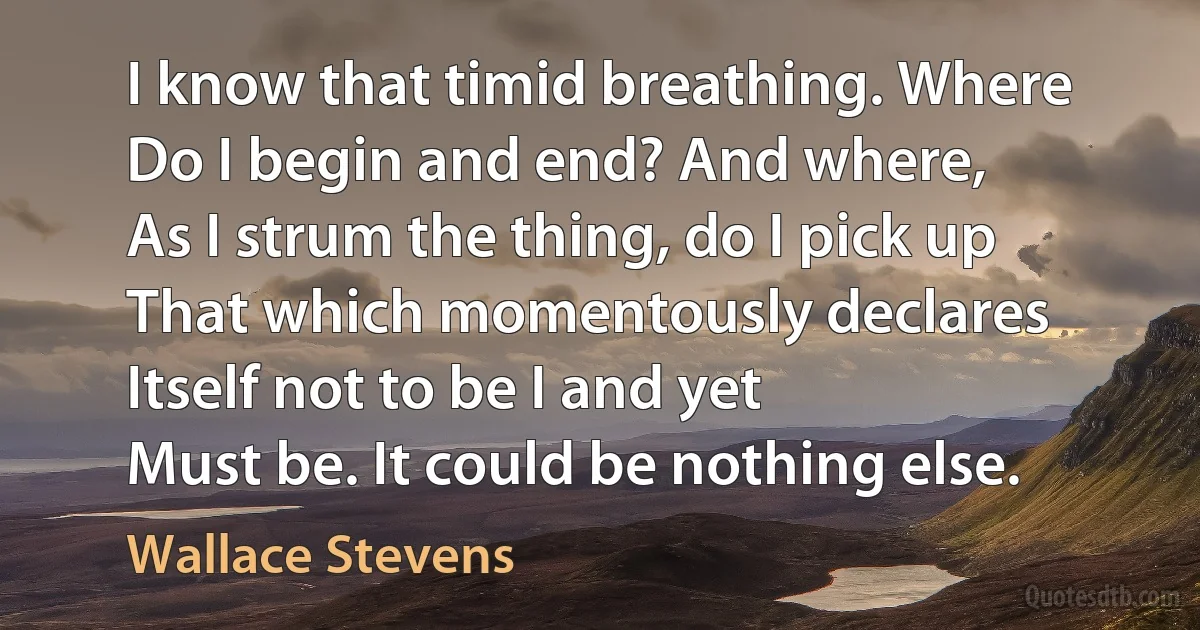Breathing Quotes - page 6
Mixed feelings when he [Max Ernst frequently writes about himself in the third person] enters the forest for the first time: delight and oppression. And what the Romantics spoke of as 'being at one with Nature'. Wonderful joy in breathing freely in an open space, but also anxiety at being encircled by hostile trees. Outside and inside at the same time, free and trapped.

Max Ernst
Behold therefore, this England of the Year 1200 was no chimerical vacuity or dreamland, peopled with mere vaporous Fantasms, Rymer's Foedera, and Doctrines of the Constitution, but a green solid place, that grew corn and several other things. The Sun shone on it; the vicissitude of seasons and human fortunes. Cloth was woven and worn; ditches were dug, furrowfields ploughed, and houses built. Day by day all men and cattle rose to labour, and night by night returned home weary to their several lairs. In wondrous Dualism, then as now, lived nations of breathing men; alternating, in all ways, between Light and Dark; between joy and sorrow, between rest and toil, between hope, hope reaching high as Heaven, and fear deep as very Hell. Not vapour Fantasms, Rymer's Foedera at all!

Thomas Carlyle
One day I walked into an operating room, to just be an observant, which we would do generally, as a medical resident. They were performing this hysterectomy, which was a caesarean section. And they lifted out a fetus that weighted approximately 2 pounds, and it was breathing and crying. And it was put in a bucket and set in the corner of the room, and everybody in the room just pretended that they didn't hear it. And the baby died. And I walked out of that room a different person... Roe v. Wade is a reflection of the moral climate of the country, because the law was being defied, and then the law was changed, the law sort of caught up with the culture. So even though we work in the legal area, and work politically, ultimately I believe it's an issue of personal morality, and is a reflection of the country, more so than just the lack of laws. Just changing the laws won't be enough, we will ultimately have to have a society that's moral enough, where the fetus deserves legal protection.

Ron Paul
It is not within our province to inquire by what process, and in what condition the Almighty brought matter into existence-what the space was which it occupied, or what the forms were which it assumed. Of such things we know nothing. In the depths of primeval time, the globe we inhabit may have a planetary existence, wheeling along its ethereal railway without a breathing passenger to count its periods, and without a living plant to measure the day by its opening and closing blossoms, or to mark the rolling seasons by the yearly increments of its stem. Or it may have been the theatre on which vast cycles of animal and vegetable life have been run- now its birthplace, and now its grave: But we have no data to guide us in our conjectures, and even imagination fails us if we call it to our aid. Whatever may have been, had ceased to be at the commencement of our history, when the primary rocks, forming the moten nucleus of the globe, were first exposed to the action of the elements.

David Brewster
When someone's body can no longer perform its functions in the natural world in response to the thoughts and affections of its spirit (which it derives from the spiritual world), then we say that the individual has died. This happens when the lungs' breathing and the heart's systolic motion have ceased. The person, though, has not died at all. We are only separated from the physical nature that was useful to us in the world. The essential person is actually still alive. I say that the essential person is still alive because we are not people because of our bodies but because of our spirits. After all, it is the spirit within us that thinks, and thought and affection together make us the people we are. We can see, then, that when we die we simply move from one world into another. This is why in the inner meaning of the Bible, "death" means resurrection and a continuation of life.

Emanuel Swedenborg
Philip Kaufman's Twisted walks like a thriller and talks like a thriller, but it squawks like a turkey.
But back to deus ex machina. This is a phrase you will want to study and master, not merely to amaze friends during long bus journeys but because it so perfectly describes what otherwise might take you thousands of words. Imagine a play on a stage. The hero is in a fix. The dragon is breathing fire, his sword is broken, his leg is broken, his spirit is broken, and the playwright's imagination is broken. Suddenly there is the offstage noise of the grinding of gears, and invisible machinery lowers a god onto the stage, who slays the dragon, heals the hero, and fires the playwright. He is the "god from the machine."

Roger Ebert
Perhaps things will become worse and then better. Perhaps there's a small god up in heaven readying herself for us. Another world is not only possible, she's on her way. Maybe many of us won't be here to greet her, but on a quiet day, if I listen very carefully, I can hear her breathing.

Arundhati Roy



